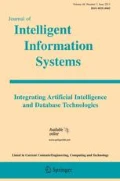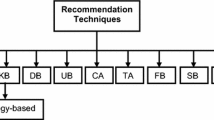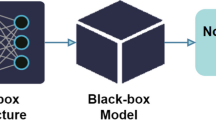Abstract
Research in cooperative query answering is triggered by the observation that users are often not able to correctly formulate queries to databases such that they return the intended result. Due to lacking knowledge about the contents and the structure of a database, users will often only be able to provide very broad queries. Existing methods for automatically refining such queries based on user profiles often overshoot the target resulting in queries that do not return any answer. In this article, we investigate methods for automatically relaxing such over-constrained queries based on domain knowledge and user preferences. We describe a framework for information access that combines query refinement and relaxation in order to provide robust, personalized access to heterogeneous resource description framework data as well as an implementation in terms of rewriting rules and explain its application in the context of e-learning systems.








Similar content being viewed by others
Notes
Namespaces have been omitted for the sake of readability.
Transitivity is ensured by the rewriting procedure itself; it does not need to be considered for the predicates themselves.
Currently optional patterns are not supported by the implementation, but the same machinery can be used to also include them into the rewriting.
The expansion of other states is omitted.
References
Assosiation of Computing Machinery (2002). The ACM Computer Classification System. http://www.acm.org/class/1998/.
Baader, F., & Nipkow, T. (1998). Term rewriting and all that. New York: Cambridge University Press.
Boutilier, C., Brafman, R. I., Hoos, H. H., & Poole, D. (1999). Reasoning with conditional ceteris paribus preference statements. In Proceedings of the Fifteenth Annual Conference on Uncertainty in Artificial Intelligence (UAI-99) (pp. 71–80). Morgan Kaufmann: Stockholm.
Brafman, R. I., Domshlak, C., Shimony, S. E., & Silver, Y. (2005). TCP-nets for preferences over sets. In IJCAI-05 Multidisciplinary Workshop on Advances in Preference Handling at International Joint Conference on Artificial Intelligence. Edinburgh, Scottland, (July). Available at: http://wikix.ilog.fr/wiki/pub/Preference05/WebHome/P07.pdf.
Brase, J. (2005). Usage of metadata. Phd thesis, University of Hannover.
Broeskstra, J., & Kampman, A. (2004). Serql: A second generation RDF query language. In SWAD – Europe Workshop on Semantic Web Storage and Retrieval. Amsterdam, The Netherlands, (November).
Ceri, S. (1992). A declarative approach to active databases. In F. Golshani (Ed.), ICDE (pp. 452–456). Los Alamitos: IEEE Computer Society.
Chomicky, J. (2003). Preference formulas in relational queries. ACM Transactions on Database Systems, 28(4):1–40 (December).
Diederich, J., Džbor, M., & Maynard, D. (2007). REASE: The repository for learning units about the semantic web. New Review of Hypermedia and Multimedia, 13(2):211–237.
Dolog, P., & Schäfer, M. (2005). A framework for browsing, manipulating and maintaining interoperable learner profiles. In L. Ardissono, P. Brna, & A. Mitrović (Eds.), Proc. User Modeling 2005: 10th International Conference, UM 2005, LNAI, (Vol. 2715). Edinburgh: Springer (July).
Dolog, P., Henze, N., Nejdl, W., & Sintek, M. (2004). Personalization in distributed e-learning environments. In Proc. of WWW2004 — The Thirteen International World Wide Web Conference. New York: ACM Press (May).
Dolog, P., Stuckenschmidt, H., & Wache, H. (2006). Robust query processing for personalized information access on the semantic web. In H. L. Larsen, G. Pasi, D. O. Arroyo, T. Andreasen, & H. Christiansen (Eds.), Proceedings of 7th International Conference on Flexible Query Answering Systems (FQAS 2006) (pp. 343–355), Lecture Notes in Computer Science 4027, 7–10 June 2006. Milan, Italy: Springer.
Dolog, P., Simon, B., Klobucar, T., & Nejdl, W. (2008). Personalizing access to learning networks. ACM Transactions on Internet Technologies. Special Issue on Distance Education, 8(2) (May).
Gaasterland, T., Godfrey, P., & Minker, J. (1992a). An overview of cooperative answering. Journal of Intelligent Information Systems, 1(2):123–157.
Gaasterland, T., Godfrey, P., & Minker, J. (1992b) Relaxation as a platform for cooperative answering. Journal of Intelligent Information Systems, 1(3/4):293–321.
Gutierrez, C., Hurtado, C., & Mendelzon, A. O. (2004). Foundations of semantic web databases. In ACM Symposium on Principles of Database Systems (PODS). Paris, France, (June).
Hayes, P. (2004). RDF Semantics. Recommendation, W3C.
Hurtado, C., Poulovassilis, A., & Wood, P. (2006). A relaxed approach to RDF querying. In ISWC’2006 — 5th International Semantic Web Conference, Lecture Notes in Computer Science. Athens: Springer-Verlag (November).
Hurtado, C., Poulovassilis, A., & Wood, P. (2008) Query relaxation in RDF. Journal of Data Semantics, 10, 31–61.
Kießling, W. (2002). Foundations of preferences in database systems. In Proceedings of 28th International Conference on Very Large Data Bases (VLDBO2) (pp. 311–322).
Kießling, W., & Güntzer, U. (1994). Database reasoning—a deductive framework for solving large and complex problems by means of subsumption. In Proceedings of the 3rd Workshop on Information Systems and Artificial Intelligence, LNCS (Vol. 777, pp. 118–138). New York: Springer.
Kießling, W., & Köstler, G. (2002). Preference SQL - design, implementation, experiences. In Proceedings of 28th International Conference on Very Large Data Bases (VLDB02) (pp. 990–1001).
Köstler, G., Kießling, W., Thöne, H., & Güntzer, U. (1995). Fixpoint iteration with subsumption in deductive databases. Journal of Intelligent Information Systems, 4, 123–148.
Lacroix, M., & Lavency, P. (1987). Preferences: Putting more knowledge into queries. In Proceedings of the International Conference on Very Large Data Bases (pp. 217–225). Amsterdam, The Netherlands.
Motro, A. (1990). FLEXX: A tolerant and cooperative user interface to database. IEEE Transactions on Knowledge and Data Engineering, 2(2), 231–245.
Nilsson, M. (2001) IMS Metadata RDF binding guide. http://kmr.nada.kth.se/el/ims/metadata.html, (May).
Stojanovic, N. (2003). On analysing query ambiguity for query refinement: The librarian agent approach. In Conceptual Modeling – ER 2003, volume 2813 of Lecture Notes in Computer Science (pp. 490–505). Heidelberg: Springer-Verlag.
Stuckenschmidt, H. (2004). Similarity-based query caching. In 6th International Conference on Flexible Query Answering System (FQAS), volume 3055 of Lecture Notes in Artificial Intelligence (pp. 295–306). Lyon: Springer Verlag.
Stuckenschmidt, H., van Harmelen, F., de Waard, A., Scerri, T., Bhogal, R., van Buel, J., et al. Exploring Large Document Repositories with RDF Technology: The DOPE Project. IEEE Intelligent Systems, 19(3), 34–40.
The Dublin Core Metadata Initiative (2008). http://dublincore.org/.
Author information
Authors and Affiliations
Corresponding author
Rights and permissions
About this article
Cite this article
Dolog, P., Stuckenschmidt, H., Wache, H. et al. Relaxing RDF queries based on user and domain preferences. J Intell Inf Syst 33, 239–260 (2009). https://doi.org/10.1007/s10844-008-0070-7
Received:
Accepted:
Published:
Issue Date:
DOI: https://doi.org/10.1007/s10844-008-0070-7




